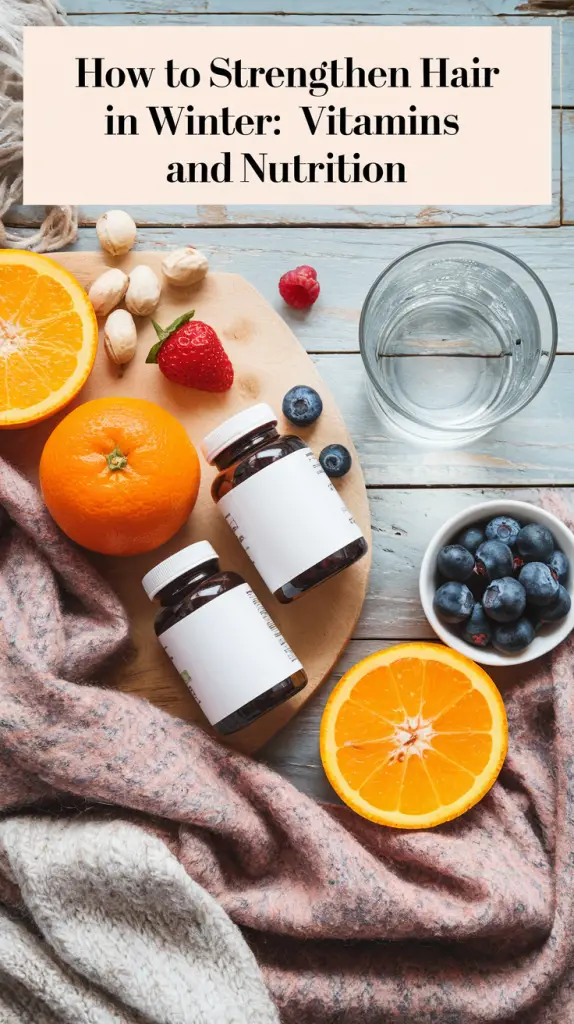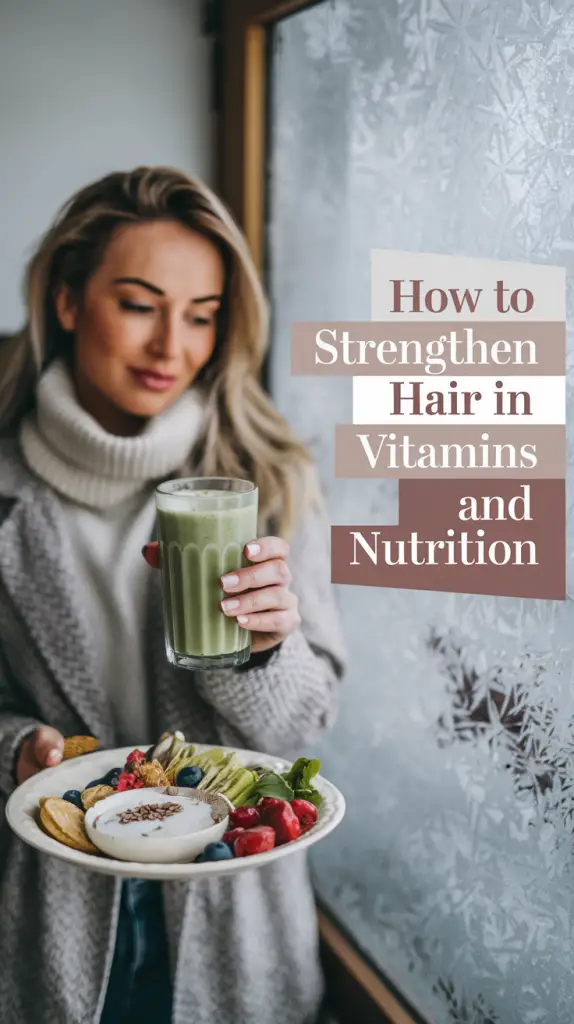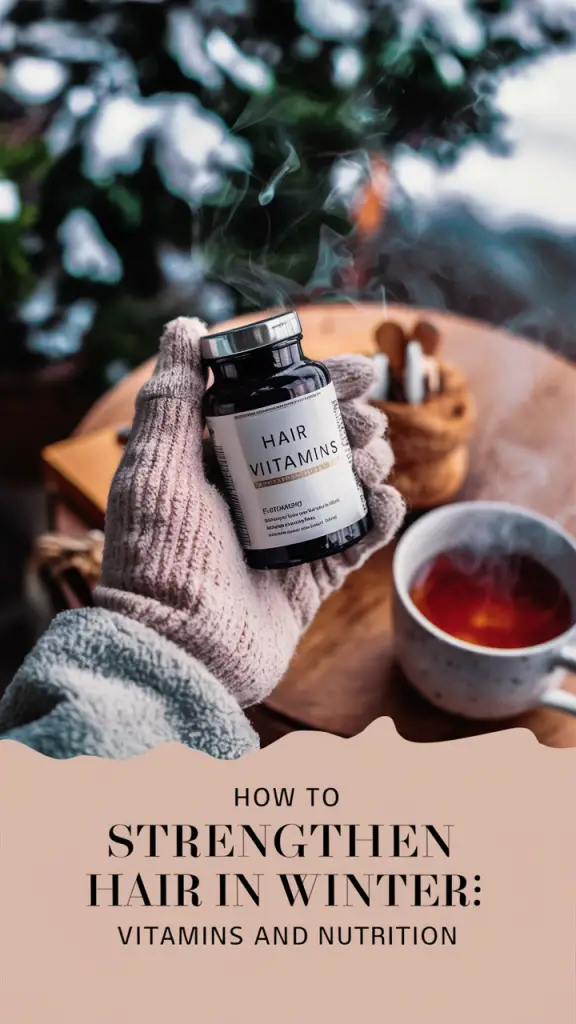How to Strengthen Hair in Winter: Vitamins and Nutrition
Winter poses unique challenges for maintaining healthy, strong hair. Cold air, indoor heating, and reduced humidity strip moisture from the scalp and hair, leading to dryness, breakage, and hair loss. To combat these seasonal woes, focusing on proper nutrition and vitamins is crucial. As someone deeply familiar with these issues, I’ve compiled a comprehensive guide to help you maintain your hair’s strength and vitality during winter.
The Impact of Winter on Hair Health
Winter weather brings specific challenges that affect hair health:
- Moisture Loss: Cold winds and indoor heating remove moisture from the scalp, leading to dryness, dandruff, and split ends.
- Weakened Hair Structure: The brittle texture caused by the cold can increase hair breakage.
- Reduced Sebum Production: This natural oil is crucial for a healthy scalp, but winter slows its production, leaving hair vulnerable.
To mitigate these effects, it’s vital to adopt a holistic approach, combining proper nutrition, hydration, and winter-specific hair care practices.
Vitamins and Nutrients Essential for Winter Hair Health
1. Vitamin A
- Why it matters: Promotes sebum production, keeping the scalp moisturized and preventing dryness.
- Sources: Carrots, sweet potatoes, spinach, and kale.
2. Vitamin C
- Why it matters: Essential for collagen production, which strengthens hair shafts and prevents breakage.
- Sources: Citrus fruits, berries, bell peppers, and kiwi.
3. Vitamin D
- Why it matters: Deficiency in this vitamin is linked to hair loss and weakened hair follicles.
- Sources: Fatty fish (salmon, mackerel), fortified milk, and egg yolks.
4. Vitamin E
- Why it matters: Acts as an antioxidant, reducing oxidative stress and supporting hair growth.
- Sources: Almonds, sunflower seeds, and avocados.
5. Biotin (Vitamin B7)
- Why it matters: Supports keratin production, improving hair’s strength and texture.
- Sources: Eggs, nuts, seeds, and whole grains.
6. Zinc and Selenium
- Why they matter: Zinc regulates oil glands around hair follicles, while selenium supports scalp health.
- Sources: Oysters, pumpkin seeds, and Brazil nuts.
7. Omega-3 Fatty Acids
- Why they matter: Add shine and promote scalp health by reducing inflammation.
- Sources: Flaxseeds, walnuts, and salmon.
Foods to Strengthen Hair in Winter
Incorporate these nutrient-rich foods into your diet for optimal hair health:
| Nutrient | Food Sources |
|---|---|
| Vitamin A | Sweet potatoes, spinach, carrots |
| Vitamin C | Oranges, strawberries, bell peppers |
| Vitamin D | Fatty fish, egg yolks, fortified cereals |
| Vitamin E | Almonds, sunflower seeds, avocados |
| Biotin | Eggs, nuts, whole grains |
| Zinc | Oysters, lentils, pumpkin seeds |
| Omega-3 Fatty Acids | Salmon, flaxseeds, chia seeds |
Additional Tips for Winter Hair Care
1. Stay Hydrated
- Why it matters: Proper hydration supports overall hair and scalp health.
- How to achieve it: Drink at least 8 glasses of water daily. Herbal teas and high-water-content foods like cucumbers also help.
2. Scalp Care
- Massage your scalp regularly with warm oils like coconut, argan, or castor oil.
- Use gentle shampoos that do not strip natural oils.
3. Protective Hairstyles
- Choose low-manipulation styles like buns, braids, or twists to prevent breakage.
4. Avoid Heat Styling
- Minimize the use of heat tools to protect hair from additional moisture loss.
5. Combat Static and Frizz
- Use leave-in conditioners or serums designed for winter to reduce static. Opt for silk-lined hats to avoid friction.
DIY Winter Hair Strengthening Recipes
- Protein-Rich Hair Mask
- Mix 1 egg, 2 tablespoons of yogurt, and 1 tablespoon of honey.
- Apply to hair, leave for 20 minutes, and rinse with lukewarm water.
- Moisturizing Avocado Mask
- Mash 1 ripe avocado with 2 tablespoons of olive oil.
- Apply to hair, focusing on the ends, and leave for 30 minutes before rinsing.
Addressing Common Myths
- Myth: “Frequent trims make hair grow faster.”
- Fact: Trimming prevents split ends but does not affect hair growth, which happens at the scalp.
- Myth: “Dandruff is caused by dryness.”
- Fact: Dandruff often results from yeast overgrowth, not dryness. Use anti-dandruff shampoos for treatment.
FAQs
1. Can supplements replace a healthy diet for improving hair health?
No, supplements should complement a balanced diet, not replace it. Whole foods provide a range of nutrients essential for hair and overall health.
2. What is the best way to protect hair from winter dryness?
Use a hydrating shampoo and conditioner, apply leave-in treatments, and wear hats with silk or satin linings.
3. How long does it take for dietary changes to improve hair?
It typically takes 3-6 months to notice significant improvements in hair health.
4. Should I wash my hair less often in winter?
Yes, washing hair 2-3 times a week helps retain natural oils and prevents excessive dryness.
5. Can stress affect my hair during winter?
Absolutely. Stress can trigger hair shedding, so incorporate relaxation techniques like meditation or yoga into your routine.
Conclusion
Maintaining strong and healthy hair during winter requires a balanced approach that combines nutrition, hydration, and mindful hair care practices. By focusing on essential vitamins, nutrient-rich foods, and adopting protective habits, you can keep your hair resilient and beautiful even in the harshest weather. Start implementing these strategies today for healthy, winter-proof locks!



